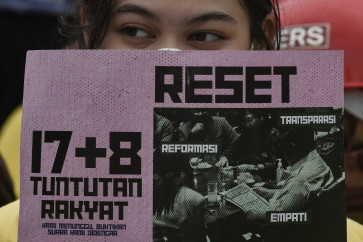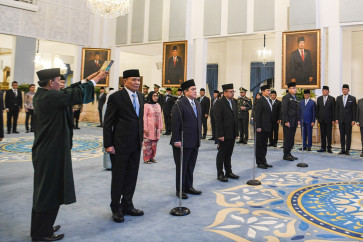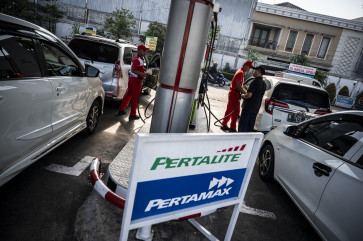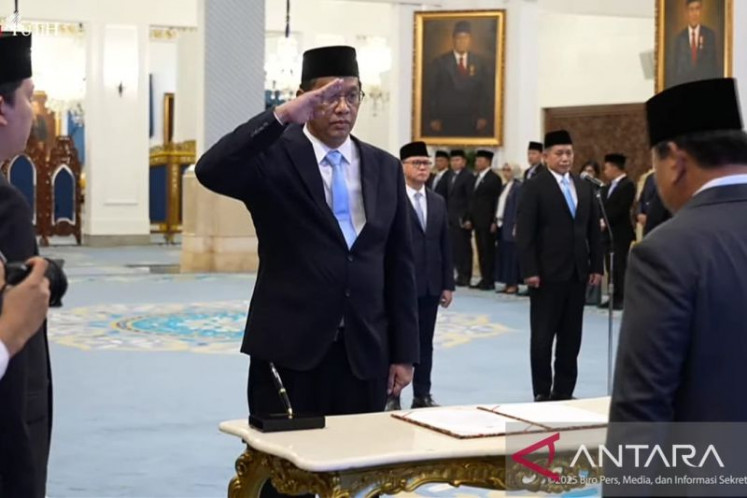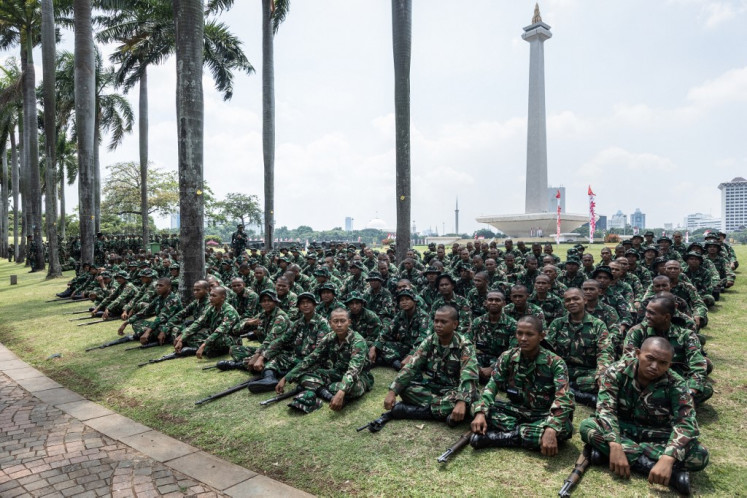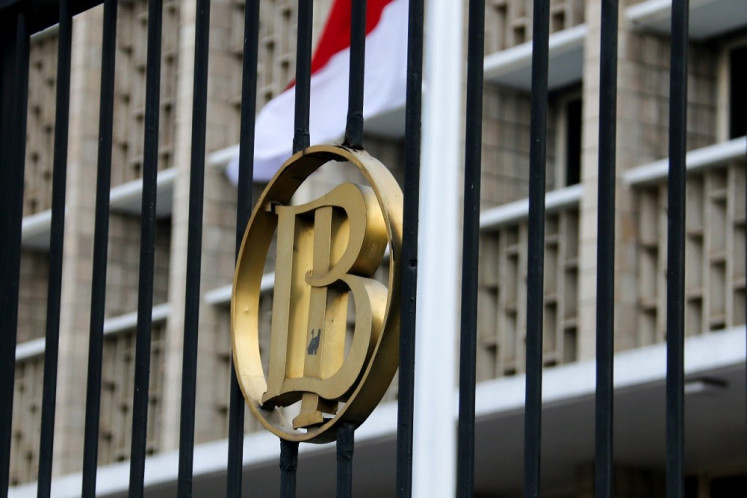Popular Reads
Top Results
Can't find what you're looking for?
View all search resultsPopular Reads
Top Results
Can't find what you're looking for?
View all search resultsJapan and ASEAN: Moving beyond symbolism to real strategic depth
Despite the constraints of Article 9 of its pacifist Constitution, Tokyo has found creative ways to support ASEAN’s defense capabilities without violating its non-military principles.
Change text size
Gift Premium Articles
to Anyone
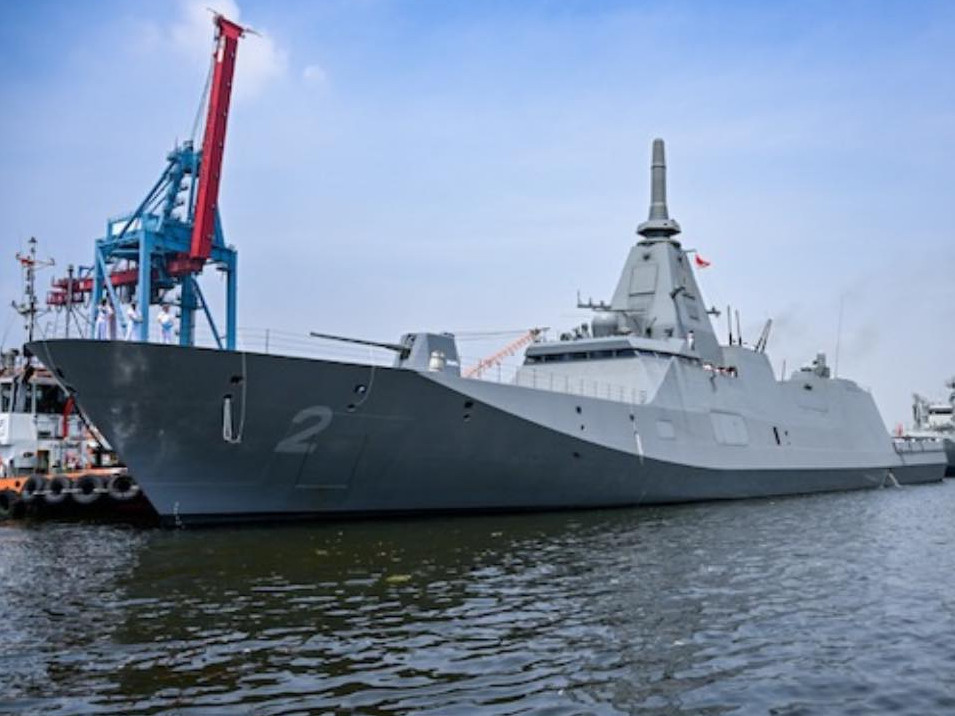 Japan Maritime Self-Defense Force's frigate JS Kumano docks at Tanjung Priok Port in North Jakarta on May 9, 2023. The Mogami-class frigate was on a deployment to Indonesia, Malaysia and Singapore to strengthen cooperation and exercise with navies in those countries. (Courtesy of Japanese Embassy/-)
Japan Maritime Self-Defense Force's frigate JS Kumano docks at Tanjung Priok Port in North Jakarta on May 9, 2023. The Mogami-class frigate was on a deployment to Indonesia, Malaysia and Singapore to strengthen cooperation and exercise with navies in those countries. (Courtesy of Japanese Embassy/-)
J
apan’s partnership with ASEAN has long been a pillar of its regional diplomacy, blending economic engagement, security cooperation and strategic trust-building.
In December 2023, Japan and ASEAN elevated their ties to an Advanced Comprehensive Strategic Partnership (ACSP), signaling a deeper commitment across multiple domains.
Yet, while the diplomatic language suggests a more robust relationship, the real challenge lies in translating these commitments into tangible results amid intensifying geopolitical competition.
Prime Minister Shigeru Ishiba, despite his fragile standing within the Liberal Democratic Party (LDP), has kept ASEAN a top foreign policy priority. His leadership, though precarious, reflects Japan’s recognition that a stable and resilient ASEAN is critical to its own economic and security interests.
Now, the ACSP must evolve beyond rhetoric and become a framework that delivers real benefits, particularly in economic resilience, technological innovation and maritime security.
ASEAN remains one of Japan’s most vital economic partners. Historically, Tokyo’s postwar economic diplomacy in Southeast Asia revolved around trade, infrastructure investment and industrial development.
As Michael Green has pointed out, Japan’s economic engagement with ASEAN has always been shaped by long-term strategic planning, ensuring that the region remains central to its global supply chains.
Today, China’s economic slowdown and strategic decoupling efforts have pushed Japan to reduce its dependence on Chinese manufacturing. Japanese companies are relocating production to ASEAN, with Vietnam, Thailand and Indonesia emerging as key hubs for semiconductors, renewable energy and electric vehicles.
This shift aligns with Japan’s broader Economic Co-Creation Vision, aimed at strengthening ASEAN’s technological and industrial capabilities while diversifying its own supply chain risks.
Japan is also leveraging its Asia Zero Emissions Community (AZEC) initiative to expand energy cooperation with ASEAN. As Steven Vogel has argued, Japan’s approach to economic diplomacy increasingly prioritizes green technology, carbon neutrality and digital transformation.
This aligns well with ASEAN’s own digital economy ambitions, ensuring that Japan remains a central player in the region’s economic modernization.
Beyond economics, Japan has expanded its security engagement with ASEAN, particularly in maritime security.
Despite the constraints of Article 9 of its pacifist Constitution, Tokyo has found creative ways to support ASEAN’s defense capabilities without violating its non-military principles.
Japan’s Free and Open Indo-Pacific (FOIP) strategy has played a key role in joint patrols, intelligence sharing and defense technology transfers with ASEAN states.
Unlike the United States, which operates through formal military alliances, or China, which often employs coercive economic diplomacy, Japan’s strategy is focused on empowering ASEAN states to defend their sovereignty.
A prime example of this approach is Japan’s partnership with the Philippines, Vietnam and Indonesia in coast guard modernization, surveillance technology and naval training programs.
This commitment to capacity-building rather than direct military intervention ensures that ASEAN states maintain their strategic autonomy while strengthening their ability to counter external threats.
One of Japan’s most delicate geopolitical challenges in Southeast Asia is its stance on Taiwan. While Tokyo officially upholds the One China policy, it has become increasingly vocal in supporting Taiwan’s participation in international organizations and enhancing its defensive capabilities.
The late Ezra Vogel argued that Japan’s security calculus has always been deeply influenced by Taiwan’s status, given its proximity to Japan’s own southwestern islands and its role in regional stability.
Recent years have seen Japan quietly strengthening security ties with Taiwan, particularly in intelligence-sharing and contingency planning.
However, ASEAN states have been reluctant to take sides on the Taiwan issue. As Suzuki Kuniko has observed, most ASEAN nations maintain a policy of strategic ambiguity, prioritizing economic ties with China while avoiding alignment with Japan or the US on Taiwan.
Despite this, Japan’s military planning increasingly incorporates Taiwan scenarios, suggesting that Tokyo’s long-term strategy will involve greater collaboration with ASEAN partners in managing potential Taiwan Strait crises.
Japan’s ACSP with ASEAN represents a significant diplomatic upgrade, but its long-term success depends on Tokyo’s ability to move beyond symbolism. ASEAN nations will judge Japan’s commitment based on actions, not words, and the real test lies in delivering concrete economic investments, technological innovation and maritime security cooperation.
If Japan can effectively implement its economic, security and technological initiatives, the ACSP could become a defining pillar of ASEAN’s geopolitical landscape.
However, if it remains a vague diplomatic framework without substance, Japan risks losing influence to other major powers competing for ASEAN’s attention.
In an era of geopolitical uncertainty, Japan must ensure that its engagement with ASEAN is not just an exercise in diplomatic rhetoric but a genuine commitment to shared prosperity and security.
***
The writer is a professor of ASEAN Studies at the International Islamic University of Malaysia (IIUM) and a senior research fellow at the Asia-Europe Institute, University of Malaya.


